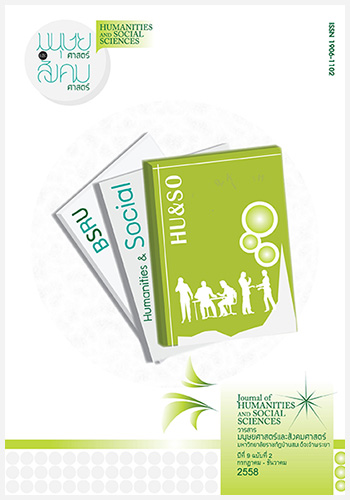อิทธิพลของความผูกพันในองค์การและความมีประสิทธิภาพในตนเองต่อผลการดำเนินงานของธุรกิจการบินของประเทศไทย
คำสำคัญ:
ความผูกพันต่อองค์กร, ความสามารถในตนเอง, สมรรถนะในการทำงาน, ธุรกิจการบินบทคัดย่อ
งานวิจัยชิ้นนี้มีวัตถุประสงค์การศึกษา เพื่อตรวจสอบอิทธิพลของความผูกพันต่อองค์การและประสิทธิภาพส่วนตนที่มีต่อผลการดำเนินงานทางธุรกิจการบินในประเทศไทย งานวิจัยนี้ทำการทดสอบโดยเชื่อมโยงพฤติกรรมองค์การเข้ากับผลการดำเนินงานทางธุรกิจโดยมีสมมติฐานว่าความผูกพันต่อองค์การและประสิทธิภาพส่วนตนมีความสัมพันธ์กันในเชิงบวกต่อผลการดำเนินงานทางธุรกิจ โดยศึกษาจากกลุ่มตัวอย่างพนักงานในธุรกิจการบินในประเทศไทย จำนวน 346 คน เครื่องมือที่ใช้ในการเก็บรวบรวมข้อมูลคือแบบสอบถาม ค่าสถิติที่ใช้ในการวิเคราะห์ข้อมูลคือการวิเคราะห์ถดถอย ผลการศึกษาพบว่า ความผูกพันต่อองค์การมีอิทธิพลเชิงบวกต่อประสิทธิภาพส่วนตนและผลการดำเนินงานทางธุรกิจอย่างมีนัยสำคัญ และประสิทธิภาพส่วนตนมีอิทธิพลทางบวกต่อผลการดำเนินงานทางธุรกิจอย่างมีนัยสำคัญเช่นเดียวกัน ทั้งนี้ ประสิทธิภาพส่วนตนเป็นตัวแปรแทรกระหว่างความผูกพันต่อองค์การและผลการดำเนินงานทางธุรกิจ ดังนั้นพนักงานของสายการบินในประเทศไทยที่มีความผูกพันต่อองค์การสูงจึงมีแนวโน้มที่จะทำให้ผลการดำเนินงานทางธุรกิจดีขึ้น โดยผ่านตัวแปรแทรกคือประสิทธิภาพส่วนตน งานวิจัยชิ้นนี้จึงแสดงให้เห็นถึงการเสริมสร้างองค์ความรู้ทั้งด้านทฤษฎีและด้านการบริหาร
เอกสารอ้างอิง
Aaker, D. A., Kumar, V. Day, G. S. (2001). Marketing Research. New York : John Wiley.
Armstrong, J. S. & Overton T. S. (1977). Estimating Non-response Bias in Mail Surveys. Journal of Marketing Research. 14, 396-402.
Allen, N. J. & Meyer, J. P. (1996). Affective, Continuance, and Normative Commitment to the Organization: An Examination of Construct Validity. Journal of Vocational Behavior. 49, 252-276.
Bandura, A. (1977). Self-efficacy : Toward a Unifying Theory of Behavioral Change. Psychological Review, 84, 191-215.
Bandura, A. (1986). Social Foundations of Thought and Action : A Social Cognitive Theory. Englewood Cliffs, NJ: Prentice-Hall.
Bandura, A. (1991). Social Cognitive Theory of Self-regulation. Organizational Behavior and Human Decision Processes, 50, 248-287.
Bandura, A. (1997). Self-efficacy : The Exercise of Control. New York : Freeman.
Bandura, A. (2001). Social Cognitive Theory : An Agentic Perspective. Annual Review of Psychology, 52,1-26.
Bandura, A. & Locke, E. (2003). Negative Self-efficacy and Goal Effects Revisited. Journal of Applied Psychology. 88, 87-99.
Bashaw, E. R. & Grant, S. E. (1994). Exploring the Distinctive Nature of Work Commitments : Their Relationships with Personal Characteristics, Job Performance, and Propensity to Leave. Journal of Personal Selling and Sales Management. 14, 41-56.
Behrman, D. N. & Perreault, W. D. (1982). Measuring the Performance of Industrial Salespersons. Journal of Business Research. 10, 355-370.
Eisenberger, R., Cotterrell, N. & Marvel, J. (1987). Reciprocation and Ideology. Journal of Personality and Social Psychology. 53, 743-70.
Hackett, R. D., Bycio, P. & Hausdorf, P. A. (1994). Further Assessments of Mayer & Allen’s. 1991 Three-component Model of Organizational Commitment. Journal of Applied Psychology, 79, 15-23.
Hair, J. F., Black, W. C., Babin, B., Anderson, R. E., and Tatham, R. L. (2006). Multivariate Data Analysis. (6th ed.) N.p. : Prentice Hall.
Kozlowski, S. W. J., Gully, S. M., McHugh, P., Salas, E. & Cannon-Bowers, J. A. (1996). A Dynamic Theory of Leadership and Team Effectiveness:
Developmental and Task Contingent Leader Roles. Research in Personnel and Human Resources Management. 14, 253-305.
Kozlowski, S. W. J., Gully, S. M., Nason, E. R., & Smith, E. M. (1999). Team compi lati on : Development, Performance, and Effectiveness Across Levels and Time. The Changing Nature of Work and Performance : Implications for Staffing, Motivation, and Development. 240-292.
Locke, E. A. & Latham, G. P. (1990). A Theory of Goal Setting and Task Performance. Englewood Cliffs, NJ. : Prentice-Hall.
Nunnally, J. C. & Bernstein, l. H. (1994). Psychometric Theory. New York, : McGraw-Hill.
Mathieu, J. E. & Zajac, D. M. (1990). A Review and Meta-analysis of the Antecedents, Correlates, and Consequences of Organizational Commitment. Psychological Bulletin. 108, 171-194.
Meyer, J. P. & Allen, N.J. (1991). A Three-component Conceptualization of Organizational Commitment. Human Resource Management Review. 1, 61-89.
Meyer, J. P., Allen, N. J. & Smith, C.A. (1993). Commitment to Organizations and Occupations : Extension and Test of a Three-component Conceptualization. Journal of Applied Psychology. 78, 538-551.
Meyer, J. P., Stanley, D. J., Herscovitch, L. & Topolnytsky, L. (2002). Affective, Continuance, and Normative Commitment to the Organization : a Meta-analysis of Antecedents, Correlates, and Consequences. Journal of Vocational Behavior. 61, 20-52.
Moorman, R. H., Blakely, G. & Niehoff, B. (1998). Does Perceived Organizational Support Mediate the Relationship Between Procedural Justice and Organizational Citizenship Behavior. AcadEmy of Management Journal, 41, 351-357.
Mowday, R., Steers, R. & Porter, L. (1979). The Measurement of Organizational Commitment. Journal of Vocational Behavior, 14, 224-227.
Mowday, R. T., Porter, L.W. & Steers, R. M. (1984). Employee-organization Linkages : The Psycholoy of Commitment, Absenteeism and Turnover. New York : Academic Press.
Organ, D. W. (1988). Organizational Citizenship Behavior : The Good Soldier Syndrome. Lexington, MA : Lexington Books.
Organ, D. W. (1990). The Motivational Basis of Organizational Citizenship Behavior. Research in Organizational Behavior. 12, 43-72.
Phillips, M. J. (2001). The Role of Decision influence and Team Performance in Member Self-efficacy Withdrawal, Satisfaction with the Leader, and Willingness to Return. Organizational Behavior and Human Decision Processes. 84, 122-147.
Phillips, M. J. & Gully, S.M. (1997). The Role of Goal Orientation, Ability, Need for Achievement and Locus of Control in the Self-efficacy and Goal Setting Process. Journal of Applied Psychology. 82, 792-802.
Porter, L. W., Steers, R. M., Mowday, R. T. & Boulian, P. V. (1974). Organizational Commitment, Job Satisfaction, and Turnover Among Psychiatric Technicians. Journal of Applied Psychology. 59, 603-609.
Porter, M. E. & der Linde, V. 1995. Toward a New Conception of the Environment-competitiveness Relationship. Journal of Economic Perspectives. 9(4), 97-118.
Sadri, G. & Robertson, T. I., (1993). Self-efficacy and Work-related Behaviour: A Review and Meta-analysis. Applied Psychology. 42 (20), 139-152.
Setton, R.P., Bennett, N. & Liden, R.C. (1996). Social Exchange in Organizations: Perceived Organizational Support, Leader-member Exchange,
and Employee Reciprocity. Journal of Applied Psychology. 81 (3), 219-27.
Shore, L. M. & Wayne, S.J. (1993). Commitment and Employee behavior. Journal of Applied Psychology. 78, 774-780.
Stajkovic, A.D. & Luthans, F. (1998). Self-efficacy and Work Related Performance : a Meta-analysis. Psychological Bulletin. 124, 240-261.
Steers, R. M. (1977). Antecedents and Outcomes of Organizational Commitment. Administrative Science Quartery. 22, 46-56.
Steers, R. M. & Porter, L. (1987). Motivation and Work Behavior. (3rd ed.). New York : McGraw-Hill.
Thomas, K. M. & Mathieu, J. E. (1994). Role of Causal Attributions in Dynamic Self-regulation and Goal Processes. Journal of Applied Psychology. 79, 812-818.
Wayne, S., Shore, L. & Lider, R. (1997). Perceived Organizational Support and Leader-member Exchange. Academy of Management Journal. 40, 82-111.
Wood, R., & Bandura, A. (1989a). Impact of Conceptions of Ability on Self-Regulatory Mechanisms and Complex Decision Making. Journal of Personality and Social Psychology. 56, 407-415.
ดาวน์โหลด
เผยแพร่แล้ว
รูปแบบการอ้างอิง
ฉบับ
ประเภทบทความ
สัญญาอนุญาต

อนุญาตภายใต้เงื่อนไข Creative Commons Attribution-NonCommercial-NoDerivatives 4.0 International License.




